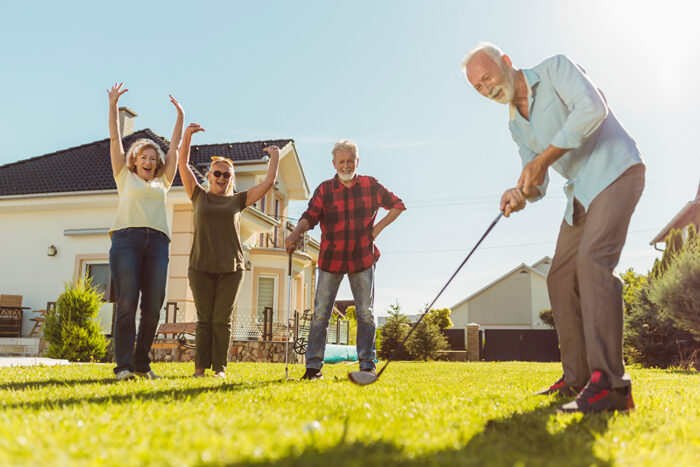Should golf clubs focus more on older or younger members?
While clubs work hard to recruit younger golfers, the overwhelming majority of members are over the age of 50. But, given the game’s health benefits to older people, LPGA Master instructor Kiran Kanwar PhD asks if clubs should focus more on getting older members to play more rather than younger people to play at all.
Did you know that 68 percent of club members in the UK are over 50 years old? Or that, according to the National Golf Foundation of the USA, the median age of golfers in that country is 54? In 2019 there were 5.9 million people aged 65 years and over playing golf in the USA.
According to one source, UK golf clubs are ‘concerned’ as the age of members continues to rise. A study of 99 clubs found that the ‘age of memberships remains stubbornly high’, with almost three quarters of club members being over the age of 50 and 33 percent being over 61. The clubs, found the study, work hard to attract younger and female members.
That seems patently absurd. When a club has easy access to such a cash cow, such low-hanging fruit, why go looking for newer categories of members who will require considerable retraining of staff, great changes in attitude and, perhaps, additional amenities?
Older adults have it all – leisure time, often a decent disposable income and the ‘bucket list’ desire to either play more golf or, in many cases, to learn golf. So why not motivate existing members – both golfers and non-golfers to play golf? Not only would it benefit any club’s bottom line, it would give all their senior members a new lease on life. If done right, golf can offer older adults important life skills in their golden years – social, physical and cognitive.

A 2016 scoping review paper by Dr Andrew Murray and others says that golf provides physical health and mental well-being, and contributes towards increased life expectancy.
The R&A funded a study named ‘Golf for Healthy Aging’ that was conducted by the University of Southern California’s (USC) Division of Biokinesiology. The research group has published several papers and posters that show how 10 weeks of twice-weekly golf allowed healthy non-golfer older adults to increase muscle strength, gait speed and cognition.
As golf has so many proven benefits for seniors, and golf clubs have lots of senior members, what should they do?
A great first step might be to ask their older members a simple question, “Why don’t you play golf?” If they have played before, it might be that they are embarrassed to have lost distance or have suffered some golf swing-related injury. Some non-golfers will say, “I’ve always wanted to but what if, after a highly successful decades-long career, I suck at golf?” or “I’m quite healthy, what if I get injured from golf?”
Mainly you will find that all these folks need to be involved with something that can improve their lives socially, physically and mentally – and golf can give them the ability to experience all three simultaneously.
This is an opportunity for every golf club. Convince your members to ‘just try out’ a new programme you have started – give it a name like USCs. “Try our programme for just a couple of weeks – it’s fun and it will improve important markers of ageing, besides helping your golf game too.”

Social benefits
All such programmes should be group-based. For couples, women only, all guys – whatever works best for your members. It will not even matter if these golfers never progress from driving range to actual course-play. Did you know that 1.3 million men aged 65 and over live alone (ageing-better.org.uk)? For them, club life could be everything. Picture ‘The Oldest Member (TOM)’ in the books of our beloved P. G. Wodehouse, eagerly waiting to accost any golfer passing by the 18th green to regale them with long-forgotten golf tales. Now imagine how relieved younger members would be to not have to hear stories from long ago while the club kept TOM busy playing his own game!
Physical benefits
One important marker of healthy ageing is muscle strength, especially of the pecs, glutes and core as well as, importantly, of hand grip muscles. Another marker is gait speed. The latter is strongly correlated with fall risk, so increased gait might help to reduce falls among seniors. These were seen to improve in the USC study. Balance, flexibility and even agility are also important for all older adults.
Thus, any golf programme ought to include firstly some subjective and objective tests to assess health levels of potential participants, followed by 15 to 30 minutes of fun, senior-specific fitness exercises that match the fitness level of a club’s members. Just straight cardio- and resistance-training often do not have adequate long-term compliance as they might be deemed boring. If the exercises are group-based and involve Zumba, Bollywood dance and other imaginative, frequently-altered workouts, more adults might enjoy them.

Mental benefits
Many aspects of golf can improve older adults’ peace- and state-of-mind. Sometimes it might require as little as just having the opportunity for some fresh air and beautiful, green environs. What would matter for long-term retention is continuing enthusiasm for participation. If a golf club can provide instruction that improves performance, golfers’ motivation to play golf will increase, as seen in one research study. Golf swing interventions should also reduce injury risk, if possible.
It cannot be emphasised enough that any golf programme for seniors should be conducted by your most highly qualified and knowledgeable golf instructors and fitness trainers – not merely new and enthusiastic assistants who might want everyone to emulate 21st century long drivers. Golf clubs, your older adult members are a duty and a privilege. All it needs is some imagination combined with some simple science-backed interventions as outlined here, for you to have a thriving older-adult golf programme that will help them and your bottom line at the same time.
LPGA Master instructor Kiran Kanwar has a PhD in kinesiology (biomechanics and anatomy) and wrote a thesis on causes of golf swing-related injuries. Kiran is also chair of Stanton University’s golf department. Visit her website www.YourGolfGuru.com















Why have you made this an either/or topic? To do so simply feeds an anti-youth and anti-female sentiment that still clings to some older, male, members. Your sentence “….considerable retraining of staff, great changes in attitude and, perhaps, additional amenities” only makes sense if your staff have never met either a woman or a person younger than retirement age or have an innate bias against anyone younger than 60 and your facilities do not include ladies changing rooms! Where are you from? Muirfield, circa 1982?
Yes, golf is a brilliant game for retired men and the health and social benefits are enormous. It happens to also be a brilliant game for women and for people of all ages. It is possible, and not difficult, for a golf club to appeal to everyone.
Great sport for all ages
Both my grandfathers were keen golfers. However, neither of them played golf before they retired. Taking up golf as a retirement activity has a long history.
Golf is an old person’s sport. It requires time and some disposable cash, both available more to older people than the young.
Young golfers are an anomaly. Clubs promote their junior sections only to see most of their members disappear as soon as the alternative delights of alcohol and girls present themselves.
Better by far to recruit older guys at the end of their football, rugby, and cricket careers. They are the golfers of the future.